If you were to ask your doctor what to do about your thyroid antibodies they would shrug their shoulders and tell you not to worry about them.
This is because, from their perspective, there’s nothing they can do about them.
Obviously, this isn’t the case, though, which is why we are having this discussion.
There are MANY therapies and treatments out there that have the potential to help lower thyroid antibodies.
Notice I said potential here because they are by no means a guarantee.
But when your only other option is to sit around and let your own body destroy your thyroid gland, they start to look pretty appealing.
DOWNLOAD FREE RESOURCES
Foods to Avoid if you Have Thyroid Problems:
I’ve found that these 10 foods cause the most problems for thyroid patients. Learn which foods you should avoid if you have thyroid disease of any type.
The Complete List of Thyroid Lab tests:
The list includes optimal ranges, normal ranges, and the complete list of tests you need to diagnose and manage thyroid disease correctly!
Introducing Selenium: The Trace Mineral Involved in Protecting Your Thyroid Gland
One of the best treatment options out there for patients with Hashimoto’s is, without a doubt, selenium.
Selenium is a trace mineral, which means your body only needs a very small amount of it.
But don’t let the fact that you need a small amount confuse you, it’s still very important.
Its importance lies in how it impacts the function of proteins and enzymes called selenoproteins.
These selenoproteins help create DNA, protect your cells from damage and infection, and are involved in the creation and activation of thyroid hormones.
If you don’t have enough selenium, and the chances of that are pretty high, by the way, then these proteins will not work correctly and you will be susceptible to thyroid gland damage.
Selenium Deficiency: Why It Matters For Thyroid Patients
Whenever we talk about nutrient deficiencies we always have to ask ourselves “How common is it, really?”.
Because if the deficiency isn’t common, then it doesn’t matter to very many people in which case it’s probably not worth making a big fuss about.
But that’s not the case with selenium because we have some numbers on the rate of deficiency.
Worldwide, we know that roughly 500 million to 1 billion people are selenium deficient (1).
If we estimate that the world has around 8 billion people then roughly 1 out of 16 to 1 out of 8 people need more of this important trance mineral.
That’s a pretty sobering thought!
And the statistic mentioned above applies to those with a gross selenium deficiency.
That number is likely MUCH higher if we start to include people who have sub-optimal levels (but not a gross deficiency).
A sub-optimal level is one that may appear normal on testing but still causes a decline in thyroid and cellular function, sufficient to cause thyroid dysfunction and minor symptoms.
Treating Thyroid Antibodies With Selenium
So how effective is using selenium at reducing thyroid antibodies?
It depends on the study you look at:
One meta-analysis of 17 different randomized controlled trials and over 1,900 people total (2), suggested that selenium supplements were “effective in treating AITD patients, and greatly reduced levels of FT3, FT4, and TBOAb in AITD patients”.
This study of over 1,900 people highlights the fact that selenium supplements CAN and DO exert a powerful impact on both thyroid function and thyroid gland inflammation.
But the story gets a little more complicated.
Another systematic review, of over 400 people, concluded (3) that “the results of these four studies…show that evidence to support or refute the efficacy of selenium supplementation in people with Hashimoto’s thyroiditis is incomplete and not reliable to help inform clinical decision-making”.
In other words, they weren’t that impressed with what they found and their advice to doctors is basically to say “You don’t need to worry about selenium right now”.
So what should you as a thyroid patient make of all of this?
It’s honestly not that complicated, here’s why:
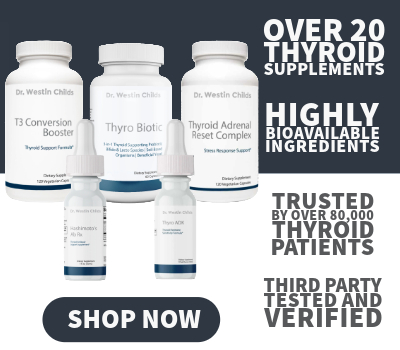
Of course, selenium supplementation is not going to work in every person because whether or not it works is likely dependent on whether or not the person taking it is selenium deficient.
In other words, the less selenium you have in your body, the more likely it is that selenium supplementation will help you.
It’s not rocket science.
And if you understand really basic thyroid physiology, it makes perfect sense why that it is.
Here’s what I mean:
Thyroid Physiology & Why Your Thyroid Needs Protection
Selenium acts to protect your thyroid gland from oxidative stress (4).
The act of creating thyroid hormone in the thyroid gland results in the production of hydrogen peroxide which can be damaging to thyroid gland cells.
Selenium helps your body produce glutathione which acts to neutralize hydrogen peroxide (5).
You can see why this becomes a problem if you are selenium deficient:
No matter what, your body is going to produce thyroid hormone because it’s required for life.
Your body doesn’t know if glutathione is present or not to protect your thyroid gland, it just keeps producing thyroid hormone because it needs it.
When you are selenium deficient, glutathione levels fall, and the very creation of thyroid hormone results in thyroid gland damage.
When this happens, proteins and enzymes (thyroid peroxidase and thyroglobulin) from the thyroid gland spill into the bloodstream.
These proteins then interact with your immune system and you end up with the thyroid antibodies characteristic of Hashimoto’s and Graves’ disease.
This is how it works in a nutshell.
By the way, this physiology is also why taking iodine has the potential to cause autoimmune thyroid disease.
Taking iodine triggers the creation of thyroid hormone, and if you trigger the production of thyroid hormone without the protective effects of selenium, you increase your risk of thyroid gland damage and thyroid autoimmunity.
If you are taking iodine, always make sure that you are either taking it with selenium or make sure you are not selenium-deficient BEFORE you take it.
How To Determine If You Should Use Selenium
After talking about all of this, what should you do as a thyroid patient?
Should you take selenium supplements or not?
Well, it depends on your situation but, based on my experience and research, I think that all patients with Hashimoto’s (and Graves’, by the way) should give selenium supplements a try.
Here’s why:
#1. Just looking at the numbers, there’s a very high chance that you are selenium deficient if you are listening to this.
With roughly a 1 in 8 chance of being selenium deficient, there’s a good chance taking this trace mineral will benefit you.
And as I mentioned previously, the reason we see variability in the positive benefit from various studies is because there’s variability in selenium status among different groups of people.
The more deficient you are (as a thyroid patient or otherwise), the more benefit you will obtain when supplementing with it.
#2. It has the potential to not only improve your immune system but also to improve thyroid function.
Yes, selenium is important for protecting your thyroid gland, but it also is important for thyroid hormone conversion.
Taking selenium is another way for you to boost your thyroid levels, specifically T3, which may help you better manage your hypothyroid symptoms.
This is true for regular hypothyroidism as well as hypothyroidism from Hashimoto’s which means this supplement is beneficial for ALL low thyroid states.
#3. It’s cheap and safe.
We’re not talking about treatments that cost thousands of dollars here, we’re talking about a treatment that you can get for under $20 dollars a month.
Not only is it relatively cheap, but it’s also safe, as long as you use it correctly.
It is definitely possible to take too much selenium, though, which is why we need to have a discussion about dosing…
Selenium Dosing: How To Avoid Taking Too Much
If you are going to supplement with selenium here’s what you need to know:
The RDA for selenium is set at around 55 mcg per day but if you are taking selenium to try and treat Hashimoto’s then you’ll want a little bit more than that.
My experience suggests that dosing in the range of 75 mcg to 150 mcg is the ideal range for thyroid patients.
And even temporary doses as high as 200 mcg for a short period of time can be helpful in some patients.
This can be confusing because people without thyroid disease shouldn’t go above 100 mcg per day.
The reason for this is that there is some potential that higher doses of selenium may increase the risk of developing diabetes (6).
I don’t think this is a concern for thyroid patients, though, because the benefits of using selenium are so high that a small risk of diabetes would be washed out in terms of the pros vs cons.
But if that is a major concern for you, just be sure to keep your total selenium intake under 100 mcg per day.
If you are going to use supplements then look for organic forms of selenium such as selenomethionine, selenocysteine, or a selenium glycinate complex.
Avoid inorganic forms like selenite and selenate.
If you prefer to get your selenium from a food source then aim to get 1/4 to 1/2 of a Brazil nut each day.
I’m not a huge fan of using Brazil nuts as a sole source of selenium, though, and if you want to learn more about why then I would recommend checking out this article right now.
While Brazil nuts may be a super source of selenium, it’s easy to accidentally take too much which can cause more harm than good in the long run.
Recap
- Selenium is a trace mineral required by the body in small amounts.
- It is required for certain proteins and enzymes to function properly and these enzymes activate thyroid hormones, create DNA, and support the immune system.
- Selenium deficiency leads to thyroid problems including an increased risk of developing thyroid autoimmune diseases like Graves’ Disease and Hashimoto’s thyroiditis.
- Supplementing with selenium may help reduce thyroid gland antibodies in certain people, especially if they are deficient in selenium.
- If you supplement with selenium, make sure to keep your dose around 75 mcg to 150 mcg per day to avoid unwanted side effects.
Now I want to hear from you:
Were you aware of the importance of selenium?
Did you know that it may help reduce thyroid antibodies?
Have you tried taking it to support your thyroid?
Did it help you feel better or reduce your thyroid antibodies? Why or why not?
Leave your questions or comments below!
Scientific References
#1. ncbi.nlm.nih.gov/books/NBK482260/
#2. pubmed.ncbi.nlm.nih.gov/33894732/
#3. ncbi.nlm.nih.gov/pmc/articles/PMC4005265/
#4. ncbi.nlm.nih.gov/pmc/articles/PMC2698273/
#5. ncbi.nlm.nih.gov/pmc/articles/PMC4210904/
#6. ncbi.nlm.nih.gov/pmc/articles/PMC8844812/
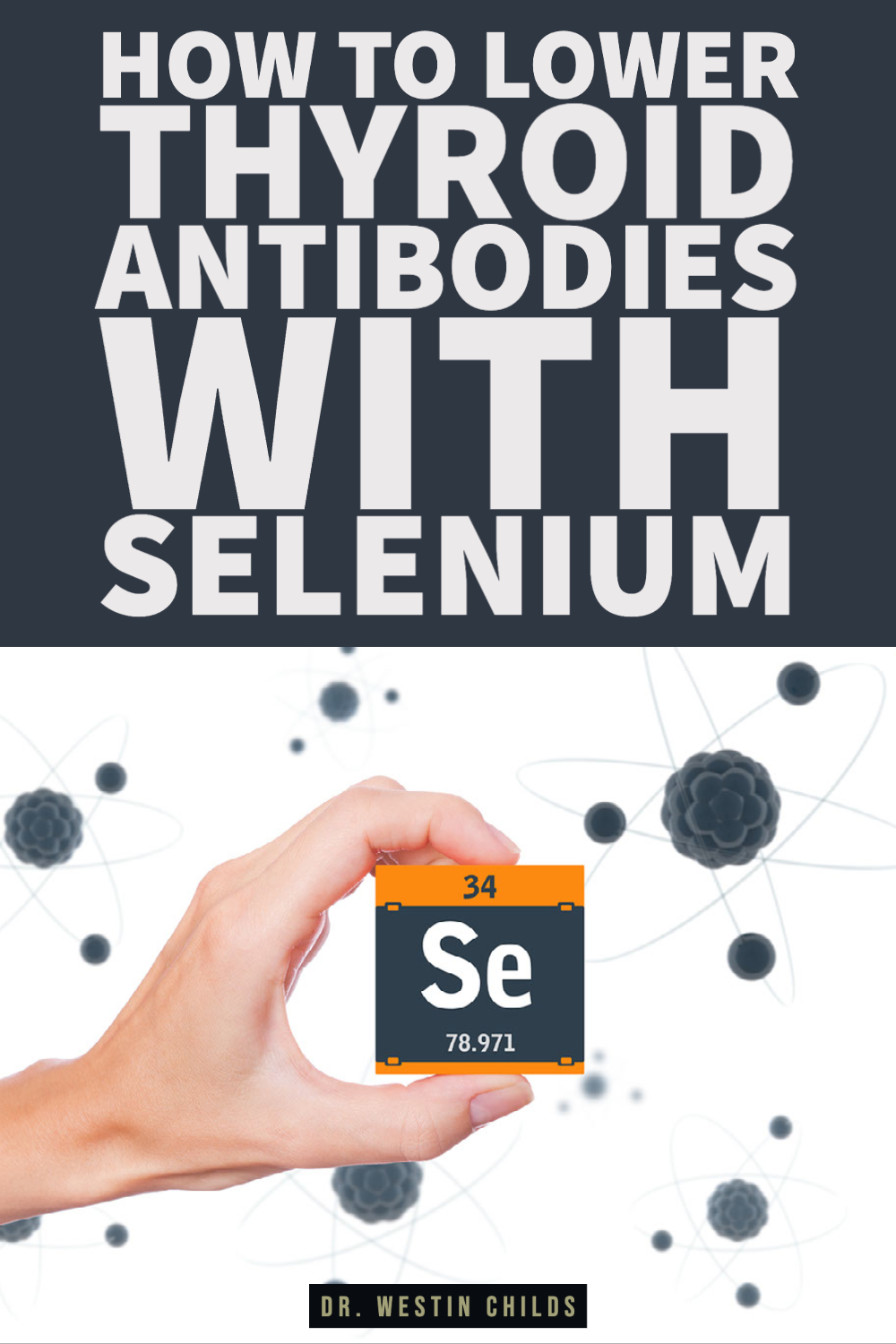
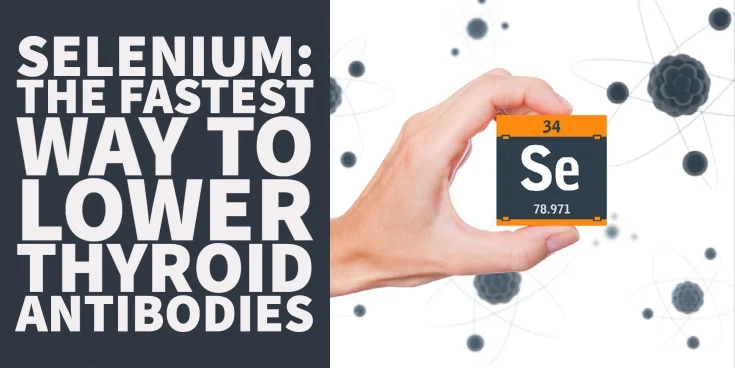


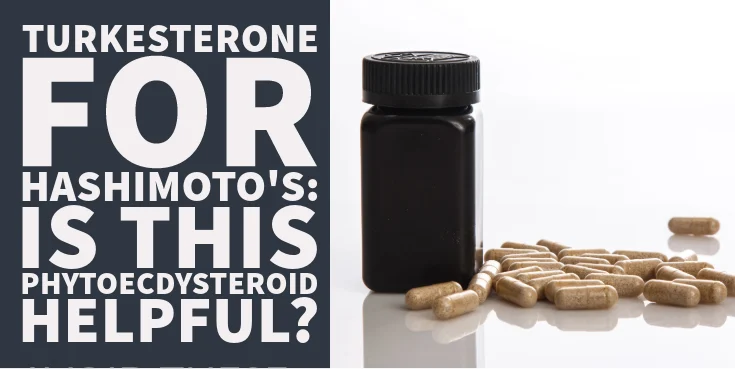
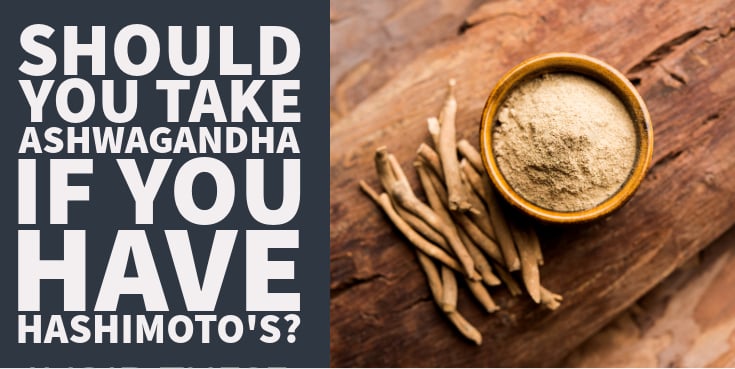
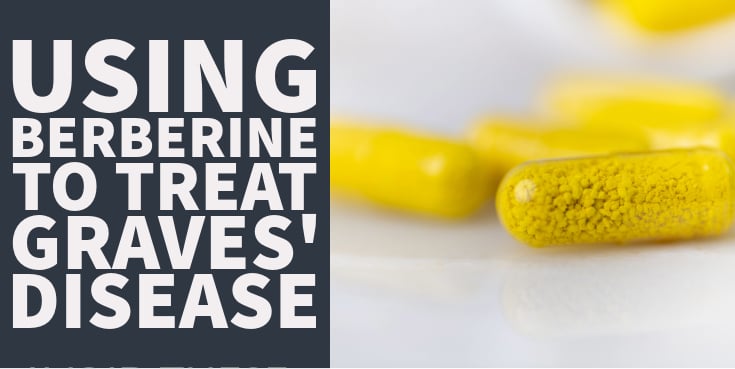
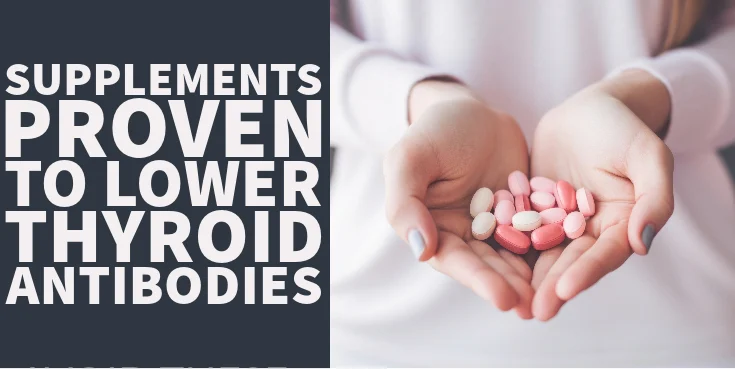
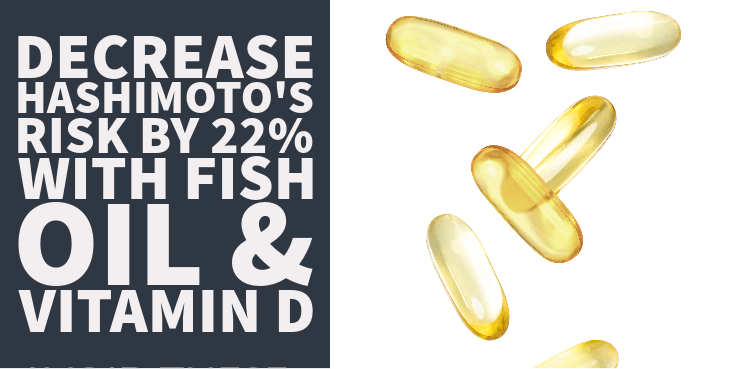

Hello Doctor,
Is it safe to take during pregnancy?
Thank you
Hi Neelofer,
It’s important to get enough selenium during pregnancy but you should always touch base with your ob/gyn or midwife prior to using any supplement while pregnant.
Hi Dr. Childs,
Since I have just a little thyroid on one side and the other side is gone,how much selenium should I take?
Hi Ramona,
As far as I’m aware, there’s no research to suggest an exact number in this situation but given that the thyroid gland is where most of the selenium is concentrated in the body, there may be a case for a smaller dose. I would still probably err on the side of regular dosing of selenium, even with only half a thyroid gland, simply because selenoproteins exist in other tissues like the liver, muscles, kidney, and bloodstream.
I am not able to access the video in this article below this title, “Introducing Selenium: The Trace Mineral Involved in Protecting Your Thyroid Gland”. I’d love to watch it. Great article. Thank you, Dr. Childs!
Hi Marlise,
You can find the link to the video directly here: https://youtu.be/kdag4f9i_OI?si=L77dxrFDFofp1i48
Two crucial pieces of information missing from this article are 1) what are the unwanted side effects (“If you supplement with selenium, make sure to keep your dose around 75 mcg to 150 mcg per day to avoid unwanted side effects”) And 2) is there a test to measure the selenium in one’s body?
I take it but have seen zero improvement of my hypo symptoms.
Hi Mary,
I’ve discussed selenium toxicity in other articles such as this one: https://www.restartmed.com/selenium-toxicity/
Unfortunately, selenium testing is inaccurate so it’s not wise to solely rely upon testing to determine when or if selenium supplementation is necessary.
Hi Dr. Childs, I have hashimoto and just started taking Selenium after watching your video. Is it alright to take 100 mcg in the morning and take another one at bedtime or is it better to take 200 mcg together? If so is it better to take it in the morning or at bedtime?
I have the same questions…..no reply to your questions posted.
I have been taking selenium 200mcg for a very long time. The capsules come in that amount. Should I just take a 200mcg capsule once every two days?
I am 74, was diagnosed with Hashimoto’s via blood tests about two years ago. My comment or question is thus: Are there articles that discuss what to eat while taking harmone medication, and if or how better diet/supplements will eventually wean us off our medication?
I take Tirosint-Sol; it has the least amounts of dyes and fillers. I actually feel best taking this. But there’s no discussion that I have found yet on how do we slowly regain our health balance, and slowly stop taking synthetic harmones. Please direct me to conversations on this concept.
Hi Linda,
Yes, you can find more information about whether or not its possible to get off thyroid medication in these articles:
https://www.restartmed.com/how-to-get-off-of-thyroid-medication/
https://www.restartmed.com/do-you-have-to-take-thyroid-medication-for-life/
I’ve been taking selenium for years, and my antibodies are over 900.
♀️
Very frustrating
Hi Theresa,
There are plenty of other supplements and therapies that can help lower thyroid antibodies. I’ve written about several that have research supporting their use here: https://www.restartmed.com/supplements-proven-to-lower-thyroid-antibodies/
Additional treatments like LDN and testosterone can also be helpful:
https://www.restartmed.com/how-to-use-ldn-for-hashimotos/
https://www.restartmed.com/testosterone-remedy-for-hashimotos-thyroiditis/
And, of course, lifestyle changes like diet, exercise, etc.:
https://www.restartmed.com/hashimotos-diet/
So Delicious Dairy Free Organic Coconut Milk contains 7mcg of selenium (L-Selenomethionine) per 1 cup serving from 1QT Tetra Pak container. (The 64 oz refrigerated carton does not contain selenium.) This is an alternate source of eating Brazil nuts.
I´ve tried taking selenium 3 times (50 mcg), but every time with that supplementation I had spotting in follicular phase or longer periods, I don`t know if it was for sure from selenium, but one other women told, that the same has happened to her and she discontinued taking selenium.Also B6 (bigger dose, 25-50 mg) seems to do the same.Can be the reason, that both lower estradiol and it leads to sudden spotting?
I find the articles very interesting and informative but not much help for those who are hyper- not hypo-. I sometimes seem to have symptoms of both with a TSH of 0.13 and a large goitre. I am very confused.
Hi Caroline,
I do write about hyperthyroidism, I just typically don’t share those articles via emails as hypothyroidism is far more common than hyperthyroidism and, generally speaking, hyperthyroid patients don’t seem to be actively looking for information like those with hypothyroidism.
In addition, there’s a lot of confusion among hyperthyroid patients regarding their thyroid status, so they often don’t know what to look for. For instance, the majority of hyperthyroid patients are actually hypothyroid because treatments like thyroid removal and RAI result in a permanent state of hypothyroidism. Unfortunately, many former hyperthyroid patients continue to consider themselves hyperthyroid, despite being hypothyroid, which is a major source of confusion for them.
For hyperthyroid patients who have undergone RAI and thyroid removal, all of the information I have on hypothyroidism is 100% relevant to them.
For those who are truly and actively hyperthyroid, I have specific information for them as well which can be found here: https://www.restartmed.com/category/thyroid/hyperthyroidism/
You’ll just need to periodically check my blog posts because I typically don’t promote those articles for the reasons listed above.
Do I need to take a selinium supplement after having had a thyroidectomy?
I’m on 100 mcg levothyroxine + 15 mcg liothyronine per day.
Hi Beth,
Even though selenium is concentrated in the thyroid gland, other tissues still require it so it is a good idea to take it. It’s not known exactly how thyroidectomy impacts the need for selenium so I would stick to the recommended dosing of around 100 mcg per day.
Were you aware of the importance of selenium?
Yes, after being dx w/ Graves 10 yr ago ( with TED)at some point early on, I was recommended 200 mg a day which I still take
Did you know that it may help reduce thyroid antibodies?
Even after 10 yr my TRabs are still running around 4, which my endocrinologist said should be 0, indicating I still have active Graves. For some reason I haven’t gone into remission. I’ve been on various doses of methimazole all along. Have been on 1/2 pill a day for past yr or so.
Have you tried taking it to support your thyroid?
Actually I always thought Selenium was to help my eye. Since I already had TED it was recommended not to do RAI or remove thyroid bec of chances of worse TED. My eye seems to finally getting better within the past year, lid still more swollen, still slight protrusion.
Did it help you feel better or reduce your thyroid antibodies? Why or why not?
So far not reduced antibodies. As far as how I feel, I sleep a lot but idk if that’s graves related after all these yrs.
Hi E Newman,
Thanks for sharing! If you are looking for additional therapies to help lower antibodies then I’d recommend checking out this article: https://www.restartmed.com/supplements-proven-to-lower-thyroid-antibodies/